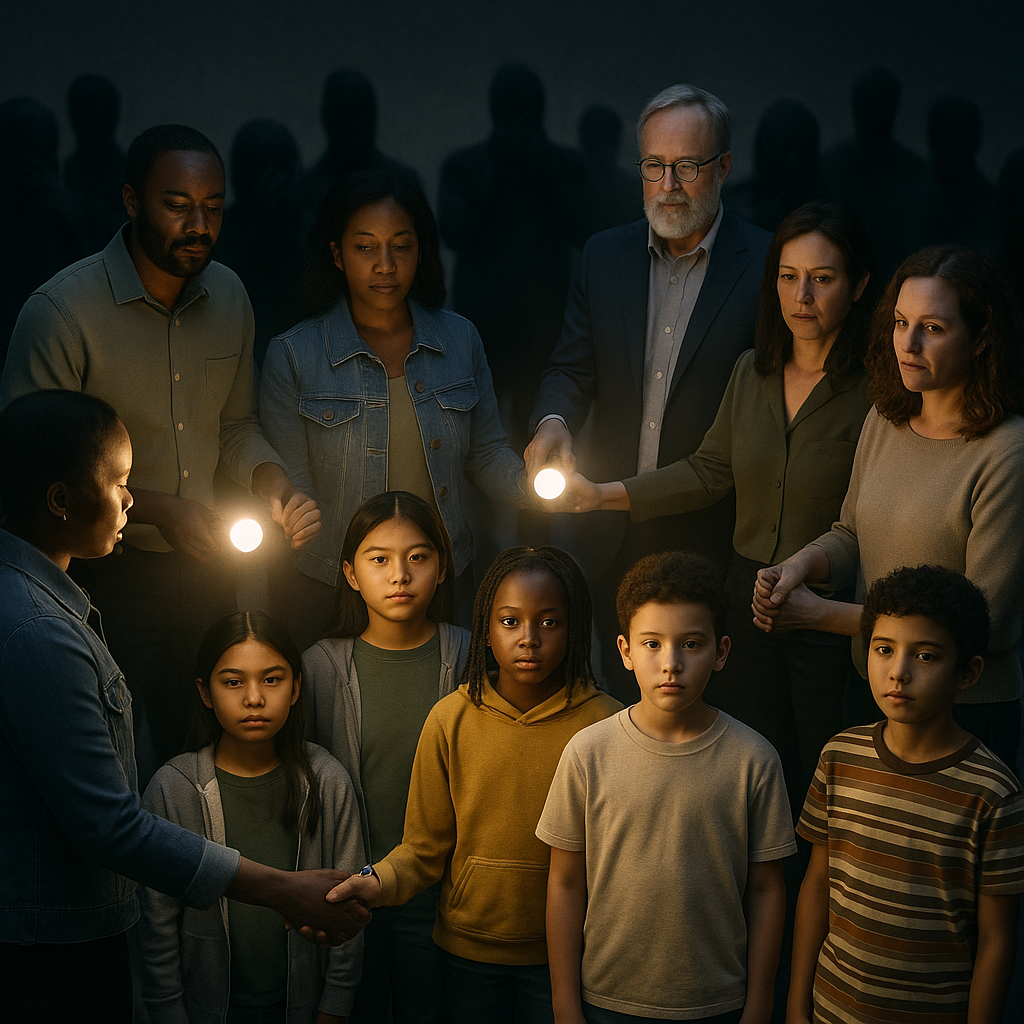The Invisible War -{5}- Final Thoughts

It’s not a crisis of monsters. It’s a crisis of blindness.
Trafficking doesn’t hide in the shadows. It hides in plain sight. In broken systems. In red tape. In assumptions. In the faces we never bother to see.
This is the war we don’t talk about. The war without uniforms or warning signs. The one where the victims are children. And the enemy is our inaction.
The Invisible War -{5}- Final Thoughts

It’s not a crisis of monsters. It’s a crisis of blindness.
Trafficking doesn’t hide in the shadows. It hides in plain sight. In broken systems. In red tape. In assumptions. In the faces we never bother to see.
This is the war we don’t talk about. The war without uniforms or warning signs. The one where the victims are children. And the enemy is our inaction.
What We’ve Learned
Part 1 showed us that the most vulnerable kids aren't the ones in the headlines, they're the ones no one is watching.
Part 2 taught us who is most at risk: children from poverty, foster care, Indigenous communities, and LGBTQ+ youth. Not because they are weak, but because the world looks past them.
Part 3 exposed the cracks: the runaway labels, the jurisdictional confusion, the misclassified data that lets kids disappear without consequence.
Part 4 revealed that survival isn’t safety. Most of those who make it out face trauma, arrest, and silence instead of healing.
Together, these parts tell the truth: trafficking doesn’t happen because no one knows. It happens because we don’t want to see it.
Why It Keeps Happening
Because trafficking doesn’t look the way we imagined. Because we’re taught to fear strangers, but not the people we know. Because society prioritizes clean images over dirty truths.
Because victims are messy. Poor. Angry. Addicted. Criminalized. And that makes them easier to ignore.
It happens because the pain doesn’t fit our preferred narrative. Because their trauma is inconvenient. Because their justice is expensive.
Because it is easier to say "runaway" than it is to say "we failed her."
Who This Really Affects
Trafficking isn’t just an issue for the inner city. It isn’t just something that happens to girls on TV. It’s happening in rural towns. In gated suburbs. In high schools. In youth shelters. Online.
It affects children of every race, every gender, every income level. But it preys most on those society already pushes to the margins:
- Black children
- Indigenous youth
- Foster kids
- Runaways
- LGBTQ+ teens
They are not inherently more at risk. They are just less likely to be believed, protected, or found.
One child is too many. Ten thousand is not a tragedy. It is a choice. A pattern. A system we haven’t challenged.
Until now.
What Must Change
- National missing persons reform: unify data collection across law enforcement, foster care, and tribal systems
- Amber Alert expansion: include high-risk runaways, not just abductions
- Federal funding for survivor infrastructure: trauma-informed housing, therapy, legal services, education, mentorship
- Education in schools: grooming, coercion, online safety
- Accountability for law enforcement and social services: especially when children fall through known cracks
This is not a problem we can arrest our way out of. It’s a problem we have to care our way through.
What You Can Do
Now that you see it—what will you do?
- Call your senator. Ask what your state is doing to fund survivor services and improve missing child response protocols.
Find your rep here. - Sponsor a safe house or survivor program in your community. If there isn't one, ask why not.
- Support frontline organizations:
- Polaris
- Truckers Against Trafficking
- RAINN
- NCMEC
- Local survivor-led programs
- Talk about this: with your coworkers, your school, your place of worship. Share the series. Share the stats. Share the silence.
Don't just be shocked. Be loud.
Final Reflection
We keep asking: Where did they go?
But they were never lost.
Every child overlooked is a choice made, until we choose differently.
They were overlooked. Misfiled. Ignored. Brushed off.
They slipped through holes we knew existed, holes we refused to close.
This isn’t just their war. It never was. It was ours all along.
The invisible war isn’t invisible because it’s hidden.
It’s invisible because we haven’t had the courage to look directly at it.Now we have. Now we choose what to do with what we see.
If You Need Help, Now or Ever, Start Here
To Report a Missing Child or Suspected Exploitation:
- NCMEC 24/7 Hotline: 1-800-THE-LOST (1-800-843-5678)
- Online Tip Submission: report.cybertip.org
- Search Active Cases or File a Report: missingkids.org
If You Suspect Human Trafficking:
- National Human Trafficking Hotline: 1-888-373-7888
- Text “HELP” or “INFO” to: 233733
- Polaris Project: polarisproject.org
- Truckers Against Trafficking: truckersagainsttrafficking.org
🔎 Search & Support Platforms:
- NCMEC Search Portal: missingkids.org
- The Doe Network: doenetwork.org
This isn’t just about “those people” or “those communities.” Trafficking and exploitation affect us all, directly or indirectly. If you’re worried about someone, say something. If you’re unsure, ask for help. And if you’re afraid, know this, you are not alone.